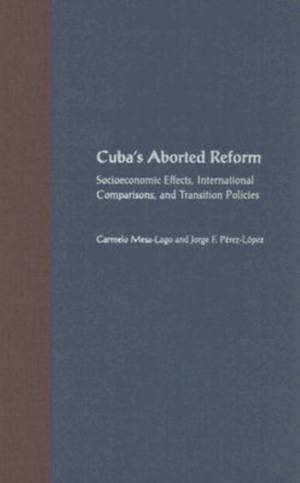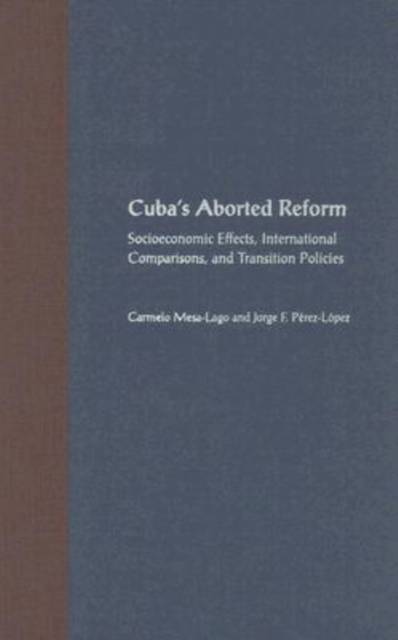
Bedankt voor het vertrouwen het afgelopen jaar! Om jou te bedanken bieden we GRATIS verzending (in België) aan op alles gedurende de hele maand januari.
- Afhalen na 1 uur in een winkel met voorraad
- In januari gratis thuislevering in België
- Ruim aanbod met 7 miljoen producten
Bedankt voor het vertrouwen het afgelopen jaar! Om jou te bedanken bieden we GRATIS verzending (in België) aan op alles gedurende de hele maand januari.
- Afhalen na 1 uur in een winkel met voorraad
- In januari gratis thuislevering in België
- Ruim aanbod met 7 miljoen producten
Zoeken
Cuba's Aborted Reform
Socioeconomic Effects, International Comparisons, and Transition Policies
Carmelo Mesa-Lago, Jorge F Pérez-López
Hardcover | Engels
€ 67,95
+ 135 punten
Uitvoering
Omschrijving
This volume analyzes Cuban socioeconomic policies and evaluates their performance since the collapse of the Soviet Union and the socialist camp. It provides a brief historical background to the crisis and analyzes in detail the deterioration and incomplete recovery since 1990. Comparing Cuba's performance with that of other Latin American and former socialist countries, it summarizes the views of noted Cuban economists and proposes policies that architects of the Cuban transition might wish to put in place after the passing of Castro.Focusing on economic and social policies and performance during the "Special Period in Time of Peace" (1990-2004), the authors draw on an impressive array of statistics (synthesized in 28 tables) to show that in 2005 Cuba has yet to return to economic levels of the late 1980s, and the access and quality of many of the highly touted social services--education, health care, social security, housing--also have not been restored to the levels achieved prior to the economic crisis triggered by the collapse of the Soviet Union. Meanwhile, they argue, poverty has expanded and unequal access to foreign remittances combined with expanding income differences have exacerbated social inequalities and widened the consumption gap between those with access to hard currency and those without.The authors demonstrate that governmental concerns about a strengthening private sector resulting in loss of political control finally prompted the Cuban leadership to prioritize political over economic ends. It aborted the modest market-oriented reforms of 1993-1996 and actually reversed them in 2003-2004, recentralized the economy, drastically reduced the limited spaces for private economic activity, exerted increasing control over hard currency, prohibited the circulation of the dollar, and stepped up repressive measures on peaceful dissidents. Centralized economic control has been fully restored, even though it will undoubtedly result in further deterioration of economic conditions and declining standards of living.
Specificaties
Betrokkenen
- Auteur(s):
- Uitgeverij:
Inhoud
- Aantal bladzijden:
- 240
- Taal:
- Engels
Eigenschappen
- Productcode (EAN):
- 9780813028682
- Verschijningsdatum:
- 30/10/2005
- Uitvoering:
- Hardcover
- Formaat:
- Genaaid
- Afmetingen:
- 164 mm x 236 mm
- Gewicht:
- 485 g

Alleen bij Standaard Boekhandel
+ 135 punten op je klantenkaart van Standaard Boekhandel
Beoordelingen
We publiceren alleen reviews die voldoen aan de voorwaarden voor reviews. Bekijk onze voorwaarden voor reviews.









